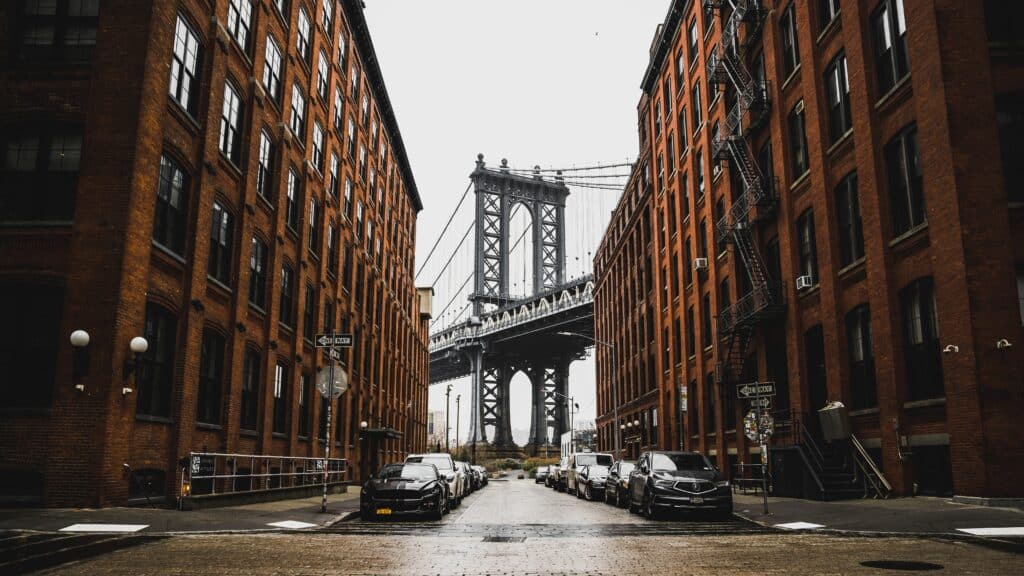Home to the largest city in the U.S., New York state offers many opportunities for immigrants who dream of running their own business. In fact, more than a third of all New York residents are self-employed immigrants, according to the American Immigrant Councuk. And, in New York City, immigrants account for 37% of residents but own 47% of the city’s small businesses.
To meet the needs of their entrepreneurs, New York offers many government incentives, grants, financing programs, and support services for anyone looking to start a business in the state.
Familiarizing yourself with these programs is an important step in starting a small business since these state networks and programs may help you find alternative resources, funding, and support for your new venture.

What businesses are popular for immigrants in New York?
Across the U.S., immigrants tend to open main-street businesses, or brick-and-mortar establishments located in the main business areas of cities and towns that sell goods and provide services. Businesses in New York reflect this nationwide trend.
Roughly three-quarters of the state’s manicurists and taxi drivers are foreign born, and immigrants who work in these occupations may be self-employed or own businesses that employ other immigrants. In addition, immigrants account for more than two-thirds of all dry cleaning workers and a portion of these people work for dry cleaners owned by those born outside the U.S.
Restaurants are popular business ideas for immigrants who live in New York City. The city has a thriving food service and tourism industry, with more than 23,000 restaurants located across the metropolitan area. More than 60% of workers in New York restaurants are foreign-born.
How to get new business incentives and financing in New York
Entrepreneurs researching how to fund a small business may qualify for numerous state incentives, grants, and financing opportunities, such as those listed below.
New York StartUP! Business Plan Competition
Each year, the New York Public Library sponsors the New York StartUP! Business Plan Competition, open to residents of Manhattan, the Bronx, and Staten Island. Immigrant entrepreneurs can enter their business plans for consideration. Winners receive grants of up to $15,000 to get their businesses off the ground.
New York Foundation Grant
Immigrants who own businesses that serve youth, older adults, and people with disabilities or that are involved with advocacy and community organizing may qualify for a grant through the New York Foundation. Each year, the organization awards multiple grants of up to $40,000.

New York State Grants Gateway
New York state government agencies frequently offer grant programs for small businesses. The New York State Grants Gateway makes it easy for entrepreneurs to find ones they may qualify for. You can register for the system for free, search by various criteria, and then click links to learn more and apply for grants online.
Global NY Fund Grant Program
The Global NY Fund Grant Program provides business grants for immigrants who own small businesses in New York and wish to export their products to global markets. For-profit companies can qualify for grants of up to $25,000 to cover the costs of expansion. This money also doesn’t need to be repaid.
LIIF Healthy Food Markets
The nonprofit organization LIIF provides grants and financing for small businesses that expand access to healthy foods in economically disadvantaged areas of New York City. Immigrants who plan to open or own bodegas, grocery stores, and other businesses that sell fresh foods may qualify for funding through the program.
Empire State Development Alternative Lender Network
Empire State Development (ESD) provides financial support for over 50 alternative lenders in New York. These financial institutions use money from ESD to offer small business loans to New Yorkers who might otherwise not qualify for business loan approval.
Alternative lenders have offices across the state, and each one offers different programs and services.
Job Development Authority (JDA) Direct Loan Program
Immigrants who wish to open manufacturing, distributing, warehousing, or service businesses in New York may gain supplemental financing through the Job Development Authority (JDA) Direct Loan Program.
Through the program, entrepreneurs planning to open startups in areas of the state identified as economic development or economically distressed zones can receive funding for up to 60% of their projects. The funding cap is 40% in other areas of the state. The JDA also partners with banks to provide up to 90% of financing for some projects.

Metropolitan Economic Revitalization Fund
The Metropolitan Economic Revitalization Fund (MERF) provides loans for new businesses that will employ a large number of people, as well as established businesses with plans to expand and create more jobs.
To qualify for a loan through the program, immigrants must start or establish a business in New York City or in parts of Nassau, Westchester, and Rockland counties within the New York region of the Port Authority of New York and New Jersey’s service area.
START-UP NY program
Through the START-UP NY program, entrepreneurs may gain tax incentives for opening small businesses in vacant retail spaces or in specially designated areas across the state.
The program gives exemptions to small businesses from many state and local taxes and provides a potential refund on sales tax collection. In addition, some employees of businesses may also qualify for credits on their state income tax returns.
Industry-Specific Funding Programs
New York has a number of financing, grant, and incentive programs for businesses in certain industries. These include agriculture, cable and telecommunications, construction, design, insurance, manufacturing, or the motion picture and television industries.
The New York State Directory of Small Business Programs includes information about these industry-specific programs, as well as all other programs available to immigrant and non-immigrant business owners in New York.
How to get business licenses, certificates, and permits in New York
Before opening a company in New York, entrepreneurs must acquire the appropriate registrations, licenses, certificates, and permits for their lines of business.
Business registration
If your business is a sole proprietorship or a general partnership, you’ll need to register with the county clerk for your county.
Limited liabilities, corporations, and limited partnerships register with the New York Department of State.
Registration fees vary based on business structure and location.

Certificate of Authority
Businesses that sell taxable goods and services must receive a Certificate of Authority from the New York State Department of Taxation and Finance (DTF). The certificate allows businesses to collect sales and use tax from customers.
In New York, taxable goods include:
- Physical personal property
- Utilities
- Food and beverages sold in restaurants and bars
- Hotel occupancy
- Select services, including those performed by salons, tattoo parlors, and fitness clubs
Local and city tax vendor registration
Depending on the location of your business, you may need to register to collect sales tax at the county or city level. Contact the county clerk for your area to learn more about additional tax vendor registration requirements.
Business and professional licenses
Some states require people who work in specific industries to have licenses. Below are some of the licensing services you can contact in New York to obtain a license for your industry.
- New York Licensing Center: Grants licenses for businesses in agriculture, construction, transportation, education, finance, manufacturing, recreation, retail, and utility delivery
- New York State Department of State Division of Licensing Services: Issues licenses for notaries, security guards, real estate brokers and agents, cosmetologists, nail technicians, and aestheticians
- New York Office of the Professions: Handles licensing for more than 50 professions in fields related to health care and social work
Permits
Local and city governments may require you to obtain various permits before you open your business. New York City has a searchable permits index that you can explore, or you can visit the NYC Business website and use the Step-by-Step guide for more information about which permits you may need.
Outside of New York City, contact your county clerk of courts for advice regarding permitting.

Other types of business support in New York
There are more than 2,500 chambers of commerce, trade networks, and professional organizations for business owners in New York State. The following list includes just a couple of key providers. You can search the internet to find more specific services in your area of the state as well.
New York City Department of Small Business Services
The New York City Department of Small Business Services (SBS) has an initiative to help entrepreneurs start businesses within the New York City metropolitan area. The organization publishes startup guides for immigrants and also provides training courses, financial assistance, and free legal services.
Chambers of commerce
Chambers of commerce represent the interests of business owners within a certain area. They often act as advocates for the business community and provide educational, training, and networking opportunities.
Business owners in New York City can join the Greater New York Chamber of Commerce. There are also regional chambers located across the rest of the state.

Industry and ethnic associations
Industry trade associations offer support for businesses within a certain industry, while ethnic trade associations serve business owners from a specific ethnic group. Examples include the Upstate New York Black Chamber of Commerce and the Contractors Association of Greater New York (CAGNY).
New York Immigrant Coalition
The New York Immigrant Coalition (NYIC) is a nonprofit group that advocates and provides services for immigrants. Entrepreneurs can benefit from their guide to opening a small business and receive mentoring and advice from business leaders associated with the organization. Additional business resources for immigrants are provided at the end of the NYIC’s guide.
